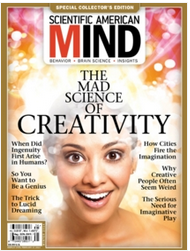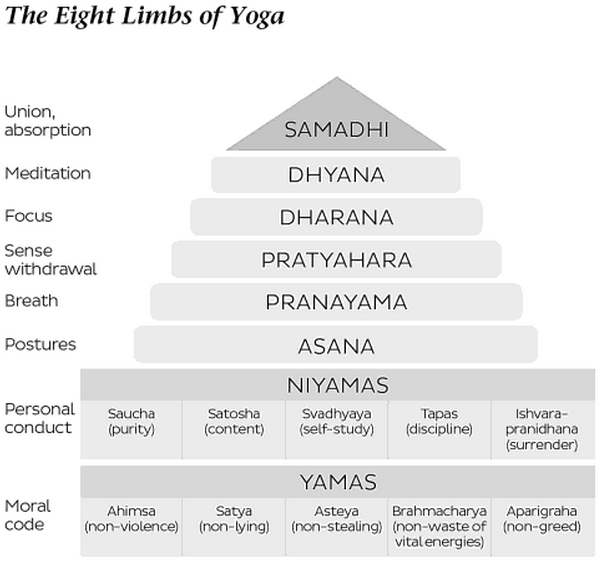Categories: Books, Cognitive Development Tags:
Your Next Brain on Yoga?
There have been a handful of studies that suggest Yoga exercise and meditative practices can improve cognitive performance and brain function in adults and children. Just the kind of stuff we report on in the Next Brain Blog.
 One challenge in using Yoga as a cognitive development technique is that most approaches appear to be limited to what you can do on an exercise mat or in quite isolation. That’s one reason the book Yoga Wisdom at Work caught my attention. The authors, Maren and Jamie Showkier, demonstrate through stories and practical tips ways you can apply Yoga “off the mat and on the job”.
One challenge in using Yoga as a cognitive development technique is that most approaches appear to be limited to what you can do on an exercise mat or in quite isolation. That’s one reason the book Yoga Wisdom at Work caught my attention. The authors, Maren and Jamie Showkier, demonstrate through stories and practical tips ways you can apply Yoga “off the mat and on the job”.
While they include material on Yoga postures, exercise and meditation, they also cover other fundamental aspects of Yoga including for example, moral code and conduct. In total there are eight areas or limbs of Yoga that are presented providing a practical and comprehensive approach.
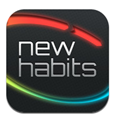 I’ve partnered with Maren and Jamie to convert the how-to content in their book into a deck of knowledge cards that can be used to practice Yoga wisdom one small-step at a time on a daily basis. You can access the results on NewHabits a free iPhone and iPad App. NewHabits comes with two free decks of knowledge cards (motivation and observation) and the Yoga deck is $0.99. Additional decks of knowledge cards covering all eight limbs of Yoga are in the works.
I’ve partnered with Maren and Jamie to convert the how-to content in their book into a deck of knowledge cards that can be used to practice Yoga wisdom one small-step at a time on a daily basis. You can access the results on NewHabits a free iPhone and iPad App. NewHabits comes with two free decks of knowledge cards (motivation and observation) and the Yoga deck is $0.99. Additional decks of knowledge cards covering all eight limbs of Yoga are in the works.
I am interested to hear from readers that use Yoga to improve their cognitive abilities. What technique or limbs do you use?
Categories: Ancient Ways, Cognitive Development, Software Tags:
Mental Performance Anxiety – Get Excited!
Most people experience performance anxiety. This includes all the feelings you have before and during a task you must do while others are watching and judging. How well we cope with these feelings often determines how well we do. Performance anxiety can be especially acute when the task we must perform involves thinking, learning, decision-making and other cognitive or mental performances. For example, knowing that you are going to have to “think on your feet” is often what worries people about public speaking.
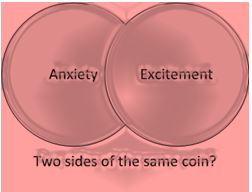 Learning to manage mental performance anxiety is critical for improving brain function and cognitive performance so it is a key topic on the Next Brain Blog. While we are often taught to try and calm ourselves down during bouts of performance anxiety, recent research indicates we may want to do just the opposite and jazz ourselves up. The idea is to reframe the energy associated with anxiety into a more productive state – excitement. As the researchers point out:
Learning to manage mental performance anxiety is critical for improving brain function and cognitive performance so it is a key topic on the Next Brain Blog. While we are often taught to try and calm ourselves down during bouts of performance anxiety, recent research indicates we may want to do just the opposite and jazz ourselves up. The idea is to reframe the energy associated with anxiety into a more productive state – excitement. As the researchers point out:
“Since both anxiety and excitement are emotional states characterized by high arousal, it may be easier to view anxiety as excitement rather than trying to calm down to combat performance anxiety…”
Start by using a simple affirmation – “I am excited” or “This is exciting because….”. Rather than resist feelings of anxiety step into the energy it offers by repeating simple but positive mental self-talk. It takes a bit of practice but it works.
I am very interested to hear from readers that have developed ways to get the most out of mental performance anxiety.
Categories: Mental Focus Tags:
Boost Recall by 50%+ Using Mnemonics
 A mnemonic is a way of organizing information to make it much easier to remember. Mnemonics are memorable representations we create to speed up learning. They are powerful and have been shown to work in a wide variety of settings. I am surprise they are not used more often.
A mnemonic is a way of organizing information to make it much easier to remember. Mnemonics are memorable representations we create to speed up learning. They are powerful and have been shown to work in a wide variety of settings. I am surprise they are not used more often.
There are several different types of mnemonics. For an excellent (and short) overview see the Nine Types of Mnemonics For Better Memory. The article covers using music, names, expressions, models, rhymes, note cards, images, connections and spellings to create more memorable representations of information. One of my favorite examples is the name mnemonic:
“ROY G. BIV = colors of the spectrum (Red, Orange, Yellow, Green, Blue, Indigo, Violet.)”
I learned this in grade school and have never forgotten it. The name, ROY G. BIV, sounds like a real name but it is unique making it very memorable. Each letter in the name can correspond to only one color so you can quickly reconstruct the entire spectrum, especially if you write the name down on a sheet or paper.
Creating good mnemonics can be a bit tricky. Just the act of trying to create a mnemonic engages us with the content and therefore speeds learning. It can make the task of memorizing more fun and if you create a powerful mnemonic you have something important to share.
Interested to hear from readers that developed their own mnemonics. Some good ones for remembering important facts about the brain would be especially appreciated.
Categories: Memory and Learning Tags:
Video & Photo Memories Impacting Your Brain?
 Most adults have watched thousands of hours of movies. I’ve often wondered how that impacts long-term memory. Do the movie memories mix with the real-world memories and change how we interpret the world, learn and make important decisions and judgments? I bet it does, big time, but I have not been able to find any detailed studies of the effects.
Most adults have watched thousands of hours of movies. I’ve often wondered how that impacts long-term memory. Do the movie memories mix with the real-world memories and change how we interpret the world, learn and make important decisions and judgments? I bet it does, big time, but I have not been able to find any detailed studies of the effects.
I did recently see a study on how taking photographs of an object can impact memory for the object. According to point-and-shoot memories, if you take a picture of an entire object you are less likely to remember details about it. However, if you zoom in on a part of the object and take a photo of the details, your memory is unaffected. The study concludes:
“This finding highlights key differences between people’s memory and the camera’s “memory” and suggests that the additional attentional and cognitive processes engaged by this focused activity can eliminate the photo-taking-impairment effect.”
With cameras in our phones and popular ways of manipulating sharing photos (e.g. Facebook, Instagram, Flickr, Pic Stich, and Pinterest) camera memories are becoming a significant part of our Next Brain.
Categories: Memory and Learning Tags:
Can Mother’s Exercise Boost Baby’s Brain Maturity?
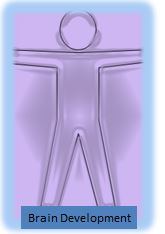 I regularly get emails from parents asking what they can do to help improve their kid’s brain function and cognitive performance. I offer plenty of tips in the Next Brain blog but am always on the look out for more.
I regularly get emails from parents asking what they can do to help improve their kid’s brain function and cognitive performance. I offer plenty of tips in the Next Brain blog but am always on the look out for more.
For example the New York Times has an interesting article about a research study that suggests as little as one-hour of exercise per week while pregnant can have a pronounced impact on how a new born’s brain processes stimulus.
“their brains were more mature,” Ms. Labonte-LeMoyne said.”
The study cautions that it is not clear if other factors are at play or if the relative advantage will persist as the child develops. The researcher conclude:
“But for now, the lesson is clear. “If a woman can be physically active during her pregnancy, she may give her unborn child an advantage, in terms of brain development,” Ms. Labonte-LeMoyne said. And the commitment required can be slight.”
I am interested to hear about other research studies that examine the impact of exercise (or lack of it) by a mother on her baby’s brain function and cognitive performance.
Categories: Child, Cognitive Development, Parent Tags:
Just How Smart are You?
Mensa is a well-known organization for highly intelligent people. To get in you need to score in the top 2% of a standardized intelligence test. There are about 57,000 members in the US. I hope they are reading the Next Brain Blog!
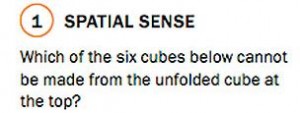 Each year the organization runs a national games competition called Mind Games. It is clear they are big on games as a way to test and boost intelligence. Check out their all ages Game Room. If you want to see how you would stack up, try out this 9-question sample (including answers), offered by Scientific American.
Each year the organization runs a national games competition called Mind Games. It is clear they are big on games as a way to test and boost intelligence. Check out their all ages Game Room. If you want to see how you would stack up, try out this 9-question sample (including answers), offered by Scientific American.
I am interested to hear from readers that are Mensa members. What tips can you share for improving brain function and cognitive performance?
Categories: Cognitive Development Tags: games
Brain Myths about Learning and Teaching
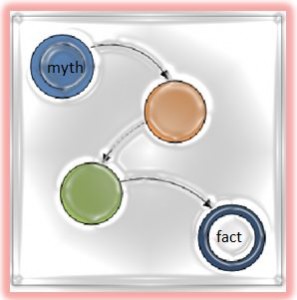 In the Next Brain Blog one of our goals is to help you apply the latest findings from neuroscience to improve or protect how well you think, learn, solve problems and make decisions on a daily basis. We want to use science to boost brain function and cognitive performance in very practical ways. One way to do that is to surface and debunk myths about the brain. So I am always on the lookout for scientific studies into myths about how our brains work.
In the Next Brain Blog one of our goals is to help you apply the latest findings from neuroscience to improve or protect how well you think, learn, solve problems and make decisions on a daily basis. We want to use science to boost brain function and cognitive performance in very practical ways. One way to do that is to surface and debunk myths about the brain. So I am always on the lookout for scientific studies into myths about how our brains work.
For example, a study published in Frontiers in Psychology examined how 242 teachers in Europe responded to common myths about how the brain works in education. The findings were striking. For example, 82% of the educators believe the myth of learning styles or:
“Individuals learn better when they receive information in their preferred learning style (e.g., auditory, visual, kinesthetic)”
This means even professional can fall victim to brain myths. Check out the myths below and see how they stack up to your beliefs. This is direct excerpt from the appendix of the paper:
- “Children must acquire their native language before a second language is learned. If they do not do so neither language will be fully acquired
- If pupils do not drink sufficient amounts of water (=6–8 glasses a day) their brains shrink
- It has been scientifically proven that fatty acid supplements (omega-3 and omega-6) have a positive effect on academic achievement
- We only use 10% of our brain
- Differences in hemispheric dominance (left brain, right brain) can help explain individual differences amongst learners
- The brains of boys and girls develop at the same rate
- Brain development has finished by the time children reach secondary school
- There are critical periods in childhood after which certain things can no longer be learned
- Individuals learn better when they receive information in their preferred learning style (e.g., auditory, visual, kinesthetic)
- Mental capacity is hereditary and cannot be changed by the environment or experience
- Environments that are rich in stimulus improve the brains of pre-school children
- Children are less attentive after consuming sugary drinks and/or snacks
- Exercises that rehearse co-ordination of motor-perception skills can improve literacy skills
- Learning problems associated with developmental differences in brain function cannot be remediated by education
- Short bouts of co-ordination exercises can improve integration of left and right hemispheric brain function
- When we sleep, the brain shuts down.”
Interested to hear from readers that have discovered and debunked brain myths. How did going from myth to fact help you improve your cognitive performance?
Categories: Cognitive Development Tags:
Cognitive Vitality As We Get Older
 You will often hear that staying “mentally active” is important for maintaining a brain health as you age. A variation on the use it or lose it theme. But what exactly does being mentally active mean in this sense? Is reading a book OK and watching an action movie not?
You will often hear that staying “mentally active” is important for maintaining a brain health as you age. A variation on the use it or lose it theme. But what exactly does being mentally active mean in this sense? Is reading a book OK and watching an action movie not?
A new study tackles this question and the findings are interesting. Turns out activities such as – playing a game, listening to classical music or solving cross word puzzles – “probably won’t bring noticeable benefits to an aging mind”. That is an interesting claim as these types are activities are frequently sited as good examples of what should provide benefit.
The key is to engage in mental activities outside your comfort zone that force you to learn new skills. For example, learning photography or quilting. The general point is:
“It seems it is not enough just to get out and do something — it is important to get out and do something that is unfamiliar and mentally challenging, and that provides broad stimulation mentally and socially,…”
Doing mental activities that we have already mastered, while still worthwhile, may not be providing the brain boost and protection we need as we age.
Categories: Cognitive Decline, Cognitive Development, Lifestyle, Memory and Learning, Older Adult Tags:
More Items for Your Brain Foods List
 In the Next Brain blog we report on foods that offer some scientific promise of either protecting your brain health or improving cognitive performance. A list of 10 Top Foods to Boost Brainpower published by Forbes Magazine caught my eye. While it includes items typically found on such lists – for example blueberries, curry and walnuts – it also includes many I don’t normally see such as chickpeas, celery and crab.
In the Next Brain blog we report on foods that offer some scientific promise of either protecting your brain health or improving cognitive performance. A list of 10 Top Foods to Boost Brainpower published by Forbes Magazine caught my eye. While it includes items typically found on such lists – for example blueberries, curry and walnuts – it also includes many I don’t normally see such as chickpeas, celery and crab.
The claim about crab is particularly interesting. A serving exceeds your daily requirement of phenylalanine, an amino acid that is needed to create dopamine. I am going to do a little research into that and will blog my findings.
Source of image: openclipart.org
Categories: Cognitive Decline, Diet Tags:

